WHAT IS THE FUTURE OF AGRELLO (DLT)? WHY YOU NEED TO GET IN NOW
The Delta (DLT) token that powered agrello. The Delta token using the technology of an ERC-20 token which built with the Ethereum technologies. It is a utility token used for some of its core functions. For example, DLT is used to - Unlock/lock contract templates - Enable/secured document signature - To contribute technological solutions to the network - o use Agrello’s blockchain interoperability features. Distributed Ledger Technology (DLT), AKA blockchain, and other similar technology, is a way to describe the technology behind distributed databases secured by cryptography and consensus. Blockchain is one type of distributed ledger technology. Other cryptosystems use other types of distributed ledger technologies. For example, IOTA uses a DLT called Tangle. That ledger is verified by many different users/computers running software (distributed), With substantially all cryptos, there is a public ledger of data (ledger) submitted and held by many users/computers (distributed), The data is recorded in sequential time-stamped blocks on the ledger (for example with blockchain) or recorded using another unique method (for example with other DLTs) and is generally secured by cryptographic hashes (crypto aka cryptographic).
Agrello is an interesting blockchain project that is currently getting quite a bit of attention. They are trying to use blockchain technology and smart contracts to disrupt one of the most entrenched industries in the world. No, we are not talking about the financial industry or the Fiat money monopolies. We are talking about the legal industry. Argello is developing solution that will make it extremely easy and efficient for people to legally enter contracts over the wires.
While there is an increasing number of cryptocurrency projects that aim to use smart contracts, Agrello is a different breed in that they are trying to bring smart contract usage far beyond the current real-world applications. Based in Estonia, one of the leading countries in the world for digital legislation and government, Agrello’s founders came to the conclusion that something needed to be done in the space to create legally enforceable smart contracts with real-world use cases.
They are focusing on building borderless networks of trust powered by digital identities and signatures. Agrello’s products are built upon the strong digital identity, that connects the real person verification and strong authentication methods together to provide secure applications for customer on-boarding, secure transactions and electronic signatures. Agrello exists with the mandate to empower the digital economy and the people who drive it. Agrello’s products use real time user verification and identity document matching to validate the real person identity. Based on that validation, the unique digital identity certificate is created. This innovative approach gives Agrello the technological edge in authenticity and security of the digital identity and electronic signatures compared to our competitors.
Agrello was founded by a team of Estonian lawyers, high-level academics, and information technology experts, with the shared vision of creating digital contracts that will forever change the way people interact with each other and interface with legal authorities. Let’s face it, everyone enters into numerous legal contracts throughout our lives, from rental and purchase agreements, to partnerships and transfer agreements, to indemnity and non-disclosure agreements, and many others. Agrello seeks to be the technology behind all these types of legal agreements, putting them on the blockchain and ensuring they are trustless and functioning. It’s even possible for non-citizens to digitally become residents of Estonia and to register an Estonian business and open a banking account in Estonia without living there. That’s significant since Estonia is a part of the European Union, meaning anyone can digitally create an EU registered company, no matter where in the world they live.
The DLT token, called Delta, is an ERC-20 compatible token that is used to power the Agrello network. The token must be used to access any of the capabilities on the Agrello platform. Agrello’s currency is Delta (DLT), an Ethereum ERC20 coin. Transactions priced over 2 Bitcoins require a KYC process, while smaller transactions are excused. In order to make transactions through Agrello, you have to first register your account and set up your wallet. Add some BTC or ETH currency to purchase Delta coins. Once your purchase is finished, you can store or withdraw your DLT coins in any Ethereum wallet.
Delta tokens are necessary to make use of Agrello’s features. It is an ERC20 compliant token. Through this token, Agrello users can interact with the contracts and wallets on the Ethereum blockchain. In order to buy DLT, you have to sign up for Agrello and set up your wallet. You can also purchase DLT from cryptocurrency exchange platforms such as HitBTC, YoBit, Mercatox, and CoinCodex. This is where CoinSwitch comes to your aid. CoinSwitch, as the largest cryptocurrency conversion platform, provides you with 45,000 pairs of cryptocurrencies to choose from, you can compare the exchange rates for DLT coins and decide on your preferred price.
The best option for Delta storage is Agrello’s wallet. You can also set up any Ethereum wallet, such as MyEther Wallet, and store your coins in it. Hardware wallets such as Ledger Nano S, Trezor, and KeepKey are some more options to keep your coins protected from online fraud.
CONCLUSION
Agrello’s mission is to upgrade the legal sector with the help of blockchain technology and make legally binding smart contracts a reality. Despite the popular usage of smart contracts in the blockchain networks, smart contracts are not available in the human language. This is because these contracts are not legally binding With Agrello, there is a new development in this scenario that has enabled the users to create and manage smart contracts with complete legal authorization. It is not only helpful for major companies that function through agreements but it also facilitates everyday activities that require contracts.
